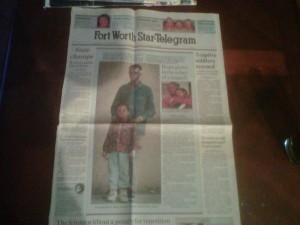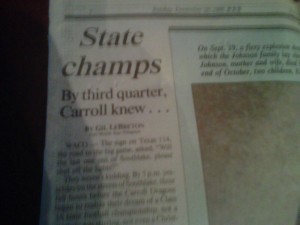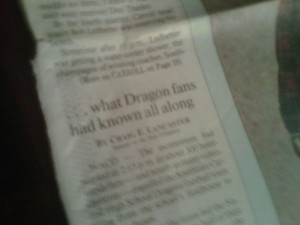Craig Lancaster's Blog, page 10
September 1, 2011
A trip back in time, newspaper style
Earlier this week, my buddy and author/blogger David Abrams was kind enough to feature an essay by me on his blog, The Quivering Pen. It was a part of his ongoing series My First Time, in which authors share breakthrough moments in their writing lives.
It's a testament to the popularity of this series that several months passed between my submission of the essay and its publication. Reading it again this week, I was struck by just how much has changed — and how much hasn't — between my first front-page newspaper story at age 18 and my current career as a newspaper copy editor now, twenty-three years later.
Let's start with the physical newspaper itself. Here's a look at the front page of the Fort Worth (Texas) Star-Telegram from December 18th, 1988, the day my story appeared (the reason I have a copy: I'm fortunate enough to have a mother who thinks everything I've ever written is golden, and who catalogs it accordingly):
The design looks a bit rudimentary, doesn't it? At that point, while desktop publishing certainly existed, papers the size of the Star-Telegram generally had not made the capital investment to put design terminals and full-page outputters into their buildings. In those days, a layout editor would draw his/her design on a piece of paper called a dummy sheet, and the type would come out in long strips called galleys that would then be cut up by compositors and arranged somewhat like a puzzle. To get those color boxes in place, sheets of amberlith or rubylith would be cut and shot in the four-color process. Color photographs would be put in place through a similar process. Everything would be shot into negatives, and then the negatives would be used to create the aluminum plates that went onto the press.
The thing that really hits me now, looking at the page, is how wide it is. I measured it at 14 inches. By contrast, the paper I work for now, The Billings Gazette, has a page 11 inches wide (and less than 10 for the "image area," the space for the news and photos).
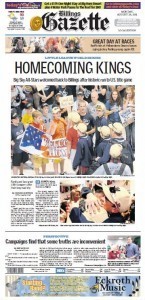 At right is an image of the Gazette Page A1 that I designed for Monday's edition. In addition to having a more modern look, it was leagues easier to put together. Everything happened at a single desk, on a single computer. Desktop publishing software is sophisticated enough to allow for applying stylized effects to photos (as I did with the promotional strip at the top, blending the photo with a background screen), to change the widths and numbers of columns of type with a single keystroke, to send the page, once finished, directly from my desk to the four plates — cyan, magenta, yellow, black — that impressed this image onto thousands and thousands of pages. None of this, of course, comes as any great surprise to anyone these days, but I think it's an interesting contrast with how I learned the trade two-plus decades ago. Back then, if a layout editor wanted to change, say, the width of the type from the the cover to the jump page, he/she would have to apply laborious typesetting code to the story on the editing end, then go to the typesetter and hope that the break came where he/she needed it to. If it didn't? Back to the editing terminal to adjust the coding. Now, type flows from one box shape to another with the greatest of ease.
At right is an image of the Gazette Page A1 that I designed for Monday's edition. In addition to having a more modern look, it was leagues easier to put together. Everything happened at a single desk, on a single computer. Desktop publishing software is sophisticated enough to allow for applying stylized effects to photos (as I did with the promotional strip at the top, blending the photo with a background screen), to change the widths and numbers of columns of type with a single keystroke, to send the page, once finished, directly from my desk to the four plates — cyan, magenta, yellow, black — that impressed this image onto thousands and thousands of pages. None of this, of course, comes as any great surprise to anyone these days, but I think it's an interesting contrast with how I learned the trade two-plus decades ago. Back then, if a layout editor wanted to change, say, the width of the type from the the cover to the jump page, he/she would have to apply laborious typesetting code to the story on the editing end, then go to the typesetter and hope that the break came where he/she needed it to. If it didn't? Back to the editing terminal to adjust the coding. Now, type flows from one box shape to another with the greatest of ease.
 On December 17th, 1988, however, I wasn't in the office building a page. I was in a football stadium in Waco, Texas, trying to conjure a color story about the fans of the Southlake Carroll High School team. To write my story, I had a Radio Shack TRS-80 (affectionately called a Trash-80), which you can see at left. See that screen? When you were writing a story, you could see only a few lines at a time, and if you had to backtrack to check something you already wrote, well, let's just say that it wasn't so easy as CTRL-F. It was, instead, a lot of backtracking and squinting at dot-matrix characters on a gray screen in search of a certain passage or fact.
On December 17th, 1988, however, I wasn't in the office building a page. I was in a football stadium in Waco, Texas, trying to conjure a color story about the fans of the Southlake Carroll High School team. To write my story, I had a Radio Shack TRS-80 (affectionately called a Trash-80), which you can see at left. See that screen? When you were writing a story, you could see only a few lines at a time, and if you had to backtrack to check something you already wrote, well, let's just say that it wasn't so easy as CTRL-F. It was, instead, a lot of backtracking and squinting at dot-matrix characters on a gray screen in search of a certain passage or fact.
What the Trash-80 lacked in utility, however, it made up for in durability — I can't tell you how many times I dropped it on hard surfaces like sidewalks and colleagues' craniums, and it survived all of them — and tactile pleasantness. The keyboard, while a bit small, was incredibly easy to use for a touch typist like me. I came to love the Trash-80 and wish now that I had salvaged a few of them when they left newsrooms 15 years ago or so.
When it was time to transmit, I needed a direct connection to a landline, which wasn't always easy to find in high school gymnasiums. I whiled away many hours in school offices — a fax machine line was perfect for transmission — and teachers' lounges, listening to that pleasing whirr and ping of the TRS-80 as it sent my stories to where they needed to go. Now, of course, reporters in the field file in all kinds of ways — modem to modem, wireless, tweets, mobile phones and, in a pinch, by dictating a story to a fast-typing colleague back in the office.
In my essay, I wrote about a despondent few hours when the paper came out on December 18th, when I figured the story I'd written wasn't good enough because I couldn't find it anywhere.
As I said in the piece:
It was below the fold of the paper, a little three-inch sliver of type in the bottom left-hand corner of the page, but there it was. I'd missed it on the first pass because it was a companion piece to [Gil] LeBreton's, with a tiny elliptical headline. In my frantic search through the paper, I'd simply mistaken it for part of LeBreton's story.
LeBreton — or, as we know him, "Leb" — was (and is) one of the paper's star columnists, and accordingly, his story had been given top billing. You can see it here:
The headline, if you can't see it, reads "State champs | By third quarter, Carroll knew …"
And several inches below, you can see my moment of glory:
The continuation of the headline: "… what Dragon fans had known all along." (There's also, sadly, the precious byline of "Craig E. Lancaster." What can I say? I was 18 and thought that a middle initial would make me more writerly.)
It was a huge thrill to see this story in my hometown newspaper, and it remains one of the biggest moments of my career. At that young age, I thought I was on my way, that if I could make the front page as a teenager, I'd no doubt be winning Pulitzers by the handful in the years to come. Things didn't quite work out that way; within a few years, I'd made the hard left turn from aspiring reporter to full-time editor, someone toiling behind the scenes and someone whose name rarely shows up in the newspaper. It was the right choice for me, a job that better suits my sensibilities. And now, of course, my writing ambitions play out in a different way.
It's not what I would have imagined for myself twenty-three years ago, but I wouldn't change a thing.
August 31, 2011
A few words about a few words
This thing up above is one of two dedications in my new book, Quantum Physics and the Art of Departure. (The other is to my wife, Angela.)
I never had the pleasure of meeting David Brockett or Bill Petter, but both men left a powerful influence on me.

David Brockett and his granddaughter Mia.
David's daughter, Amy Pizarro, and I were co-workers at the San Jose Mercury News and are great friends. She's the kind of friend — and I'm lucky enough to have several of these — who is right there at the moment you most need an encouraging word or someone to listen to your troubles. Because of the vagaries of day to day life and distance, I can go weeks and months without talking to her, only to find that everything falls away when I do. She is, simply put, a wonderful person.
Her dad ended up with a copy of 600 Hours of Edward and just loved it, so much that he and I struck up a correspondence by e-mail. David was a long-haul trucker, and we had an appointment to get together the next time his work brought him through Billings.
Sadly, it never happened. He got sick and died so quickly, it took my breath away. Took everybody's breath away.
Amy details that on her blog, and I can't suggest strongly enough that you go check it out. It's a beautiful tribute to a man and a father.
Bill Petter is another guy I'm left to wish I'd had the pleasure of meeting. His daughter, Donna Moreland, is another of my friends, one of the many I've picked up on Facebook.
When Bill died on March 21, the outpouring of tenderness and stories from Kirkland, Wash., where he lived, was just incredible. Here's but a sample. Donna told me that 600 Hours of Edward was one of the last books he read and that Edward's fascination with numbers and process was something he shared with Bill. There's just no way to say with any degree of adequacy how much sentiments like that mean to me.
We lost greatness with the passing of these two men. Luckily for us, they left legacies — in the daughters they raised and the lives they touched. I think you ought to know.
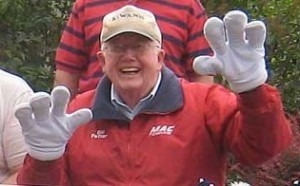
Bill Petter and his Mickey Mouse gloves.
August 30, 2011
Inside 'Quantum Physics,' Part 10
We continue today with the story behind the story on the 10th and final piece of short fiction from my upcoming collection, Quantum Physics and the Art of Departure. To read previous installments, go here.
COMFORT AND JOY
Backstory: I originally wrote this story over the course of two days in December 2010 and published it in e-book form. It sold for $1, and I donated the net proceeds from those sales to Feed America. Now that it's part of a larger book — roughly 10 percent of it — I will be donating 10 percent of the net proceeds from sales of Quantum Physics and the Art of Departure to that same organization. Also, an abridged version of this story is scheduled to appear in the Winter 2011 issue of Montana Quarterly.
Here's an excerpt:
As spring melted toward summer, an answer to that prayer arrived. Life next door to Frank went back to some semblance of what it had been before. The woman went to work and came home. The boy went to school and then, as June rolled around and the summer break took hold, he and his friends often hung around the house, tossing a football in the yard or playing basketball in the driveway. Frank caught snippets of these things through the window. He would watch and sip his coffee, and then he would return to her.
Frank's other prayer, that Lucy's pain would subside, was a tougher sell with God. She barely moved some days, and Frank would have to pick her up and carry her to the bathroom. The small act of sitting on the toilet would aggravate the cancer that had metastasized in her bones, and in her agony she could barely make a sound, depleted as her lungs were. Frank would hold her close, careful not to hurt her further, and blink back the tears.
When he found the compression sores, he gave in and called for help from hospice, finally admitting that he couldn't tend to her alone anymore. The nurses came in, and there wasn't much they could do, either. They dressed her wounds and tried to make her comfortable.
Lucy died in the early hours of a Wednesday in late July. Nobody left flowers in her yard.
Trivia: In this story, I managed to work in some details about one of my heroes, a retired NASA engineer named John Aaron. If you saw the movie Apollo 13 — and if you didn't, please rectify this oversight immediately — you saw Aaron portrayed by .
Take a look (Dean, as Aaron, shows up around the 6:30 mark of this clip):
____________________
Quantum Physics and the Art of Departure will be officially released on Dec. 6, 2011. Between now and Sept. 15, advance signed copies can be purchased here for only $10.50 (plus shipping). These copies will be sent out well ahead of the release date.

August 29, 2011
Inside 'Quantum Physics,' Part 9
We continue today with the story behind the story on the ninth and penultimate piece of short fiction from my upcoming collection, Quantum Physics and the Art of Departure. To read previous installments, go here.
SAD TOMATO: A LOVE STORY
Backstory: This entry will be very brief. Very brief. This is a continuation of an earlier story in the collection, Alyssa Alights. Beyond that, there's almost nothing I can say about it that wouldn't be a spoiler. It's quite unlike any story I've ever written before.
Here's an excerpt (a single paragraph, the first one):
The first time he cut her, she felt the endorphins rush her head and she thought, just for a moment, that she was going to die. It felt so fucking good. The blade sliced a clean, straight line above her ankle, and the blood held back until her heart beat again. It came first in a trickle and then a pour. He handled the knife like he was born to do it, the tip of his wet tongue hanging from his mouth as his eyes, immovable, focused on the target and the line. She looked at him and she wanted him so bad, and after he cut himself, too, she had him. She rode him until they collapsed together into the drying blood that stained the sheets. She didn't wake up until after noon, and then the metallic smell of what they had done with the knife turned her on all over again, so she woke him.
Trivia: The real-life event that inspired this story happened on the week of my birthday in 2008. How's that for a teaser? Once you read the story, feel free to write to me at amindadrift at gmail dot com and inquire about it. I'll happily spill.
____________________
Quantum Physics and the Art of Departure will be officially released on Dec. 6, 2011. Between now and Sept. 15, advance signed copies can be purchased here for only $10.50 (plus shipping). These copies will be sent out well ahead of the release date.

August 26, 2011
The Word: Quantized
The drill: Each week, I ask my Facebook friends to suggest a word. I then put the suggestions into list form, run a random-number generator and choose the corresponding word from the list. That word serves as the inspiration for a story that includes at least one usage of the word in question. This week's word is contributed by Melissa Tyson. For previous installments of The Word, click here.
"Okay, so tell me what happened." I didn't expend a single syllable of small talk. I'd asked him, then implored him, then pleaded with him to tell me by e-mail, and he had refused me flat. He wanted to have that conversation publicly, with a beer in his hand. So there we were.
"Okay, so you know the show Friends, right?"
"Everybody knows Friends."
"Okay, so you know how Ross and Rachel were together, and then they had a fight, and Ross had a little fling thinking they were 'on break,' but they weren't, according to Rachel?"
"I'm familiar."
"Well, that's what happened."
"You had a fling thinking you were on break?"
"No, she did."
"And you said you weren't on break?"
He squeezed the lemon into his tea and tossed the rind into the drink. "Let me try this again. Have you seen the movie Midnight Run?"
"No."
"It's not important. Good movie, though. You should totally see it."
"Okay."
"So, anyway, Robert DeNiro plays a bounty hunter. Only he wasn't always a bounty hunter. He used to be a Chicago cop. And he still loves his wife, but she's married to a crooked Chicago cop who ran Robert DeNiro out of town."
"So you're Robert DeNiro?"
"For purposes of this story, yes."
"And you're saying that you still love your wife, but she's married to a corrupt Chicago cop now?"
"The cop bit isn't important. I'm just using this particular movie to set up a parallel situation."
"Okay, but the part about still being in love with your wife, that part's true?"
"Well, sort of … not exactly. You know what? I'm not really doing a good job of explaining this."
"No, you're not."
"Let me try again."
I poured a second glass of wine. "Okay."
"So, have you seen From Here to Eternity?"
"I love From Here to Eternity."
"Isn't it awesome?"
"It's my favorite movie."
He sat up a bit straighter and smiled for the first time. Also for the first time, I was glad I'd come. "Mine, too," he said.
"But what about it?" I asked.
"Okay, you know how Burt Lancaster and Deborah Kerr are in love, but it's forbidden love, because she's the wife of his commanding officer?"
"Yeah."
"That's what it was like."
"Wait—"
"Yeah, that's it."
"Wait, so you're Burt Lancaster? You're not tall enough to be Burt Lancaster." I popped a hand over my mouth. Wine as truth serum would do me no favors.
"No, I'm the commanding officer."
"You're an uncaring, callous leader of men?"
"Again, the actual occupations and personas in the movie are of little matter," he said. "I'm just trying to illustrate the situation in a way that's accessible."
I topped off my glass and winked at him. "And doing a damn skippy job of it."
"This is frustrating," he said.
"Look at me," I said, and he did. "I think you're making a mistake trying to liken this to movies and TV shows. Why don't you just tell me, in words you choose, what happened."
"I don't think I can."
"Of course you can. You can speak, can't you?"
"Yes."
"So what's the problem?"
He looked down at the table and drew geometric patterns in a spilled packet of sugar. I drained my glass of wine and filled it again.
"She quantized my heart."
I set the glass down. "What?"
"She quantized my heart."
"What does that mean?"
"Quantized. You know … quantized."
"No, I don't."
"It's where something large and continuous is constrained down to something discrete."
"Such as?"
"Well, okay, are you familiar with the James Bond movies?"
"Of course."
"Okay, there have been a lot of actors who played Bond: Sean Connery, George Lazenby, Roger Moore, Pierce Brosnan, Daniel Craig."
"You forgot Timothy Dalton."
"OK, him, too."
"No, don't just casually throw him in. Timothy Dalton is hot. Say it like you mean it."
"Right. Okay. Timothy Dalton, he's in like flynn. Better?"
"Totally."
"So, what if we had all these Bonds, but we wanted to isolate the one who was born in 1930 in Edinburgh, what would we do? We'd have to quantize them."
"Connery?"
"Right."
"That's so … weird."
"How so?"
"I asked you to use your own words, and quantize is what you came up with?"
"Quantize is a good word."
"Quantize is an obscure word."
"Not if you're a physicist, it's not."
"You're a physicist?"
"I am."
"This explains so much."
"It does?"
"Yes. You're a physicist. And you like movies."
"I am. And I do. Is that bad?"
"I don't know."
"Are you willing to find out?"
I considered my glass, which I'd drained. Again. "Are you willing to buy me another bottle of wine?"
August 25, 2011
Inside 'Quantum Physics,' Part 8
We continue today with the story behind the story on the eighth piece of short fiction from my upcoming collection, Quantum Physics and the Art of Departure. To read previous installments, go here.
SHE'S GONE
Backstory: Long after I wrote about Ross Newbry as an adult, I came back to him, this time as an adolescent. Since family relationships seem to be the vein of fiction that I most eagerly mine, I wanted to explore the question of how the reverberations of childhood can mark us and influence our actions as adults. The result was this piece of short fiction, set in the early '80s in Miles City, Montana. It's another father-son story — an area that has been well-trod in my first two novels — but this one tacks a much different course.
Here's an excerpt:
"That's not much of a story," the boy said, scooping the last bite of ice cream into his mouth.
"I just figured you'd want to hear it," Dwight said, a bit too quickly, and he winced as he realized that he'd let the boy know he'd been wounded.
"No, you said it was too good a story to waste," Ross said, staring at him. "It wasn't good at all. It sucked."
Dwight tugged at the napkin on the table, straightening it.
"What are you so angry about, Ross?"
"I'm not angry. I'm really glad you and Mom had a great day. That's so awesome. Didn't really stop you from leaving us, though, did it? You're here, she's at home, she doesn't want me, I'm here, I don't want to be with you. It really worked out for me, didn't it?"
Dwight clasped his hands in front of him. "Ross—"
"Shut up."
"Listen—"
"Shut up."
"Ross, about me and your momma—"
"Shut up!" The boy threw back his chair, crashing it against the stained-wood wall of Dwight's trailer. He ran to his room, shaking the doublewide again with a slammed door.
For a long time, Dwight stared into his bowl, waiting for his heart to thump with less urgency. When he finally scooped out some of the melted vanilla, the sound of his spoon clinking against the bowl reverberated in a house that had gone silent.
(Copyright © 2012 Craig Lancaster)
Trivia: Jim Quillen, the violent father at the center of my novel The Summer Son, is in the heart of this story, too. It's a few years on from the breach between Jim and the narrator of the novel, his son Mitch. Jim's appearance was in no way planned, but I have to say, he fit perfectly into this story, and it was good to see him again.
____________________
Quantum Physics and the Art of Departure will be officially released on Dec. 6, 2011. Between now and Sept. 15, advance signed copies can be purchased here for only $10.50 (plus shipping). These copies will be sent out well ahead of the release date.

August 24, 2011
Inside 'Quantum Physics,' Part 7
We continue today with the story behind the story on the seventh piece of short fiction from my upcoming collection, Quantum Physics and the Art of Departure. To read previous installments, go here.
STAR OF THE NORTH
Backstory: This story, about a prison inmate waiting out a life sentence for a murder he's never denied, was inspired by a specific event in my own life that didn't happen. I can't give all of the details without undermining the story a bit, so let me just say this: More than 20 years ago, on the precipice of a huge change in my life, I felt as though my family had been violated in a way that made me angrier than I've ever been in my life — so much that, had I been able to get my hands on the perpetrator, I might well have changed the trajectory of my future. So now, all these years later, I'm relieved that I never had a chance to act on that urge for retribution. The protagonist in this story, Ray Bingham, did have that opportunity. A lot of stories come to me this way; I think about an event from my own life, or the life of someone I know, and I play games where I extrapolate the path not taken.
Here's an excerpt:
After lights-out, Ray kept his eyes open and chewed on the question of regret. To his recollection, Judge Mabry had been the first to ask about it, at the sentencing. The old jurist had spent much of the trial either polishing his glasses or idly spinning them by the temples. But at the final hearing, Mabry had pulled the glasses on and peered over them at Ray and asked if he wished to acknowledge the pain of Jeff's family, if he had come to terms with the horrible thing he had done.
"Hell, no, I don't regret a thing," Ray had said. "Jeff deserved what he got, and I gave it to him. That's about the size of it."
"Young man," Judge Mabry had answered, "you will find prison a cold and lonely place with that approach."
In the intervening years, Ray had come to agree with Mabry about cold and lonely, but he didn't figure it had anything to do with his attitude. That's just the way prison was, for everyone.
Ray flopped over onto his left side, facing the wall, and doubled up his pillow.
I'll never see a day outside this place, he thought. I know that now. But if the price of being free is remorse about something I'm glad I did, something I'd do a hundred times out of a hundred if given another chance at it, I'd rather stay here.
(Copyright © 2012 Craig Lancaster)
Trivia: One of Ray Bingham's cherished memories is of a blue Mustang named Caroline he once bought at a car lot in Arvada, Colorado. I, too, bought a blue Mustang in Arvada. I never named her. She never deserved it.
____________________
Quantum Physics and the Art of Departure will be officially released on Dec. 6, 2011. Between now and Sept. 15, advance signed copies can be purchased here for only $10.50 (plus shipping). These copies will be sent out well ahead of the release date.

August 23, 2011
Inside 'Quantum Physics,' Part 6
We continue today with the story behind the story on the sixth piece of short fiction from my upcoming collection, Quantum Physics and the Art of Departure. To read previous installments, go here.
THE PAPER WEIGHT
Backstory: Like Alyssa Alights, this was salvaged from a novel that didn't make it to the finish line. For a long time, I've wanted to write a good blast-off on the challenging times newspapers and newspaper journalists now face. When I started my career more than 20 years ago, I knew what I was getting into, having had a stepfather who was a longtime reporter. But it also seemed, at the time, like a rock-solid profession, full of job security and interesting assignments. Well, the latter still exists, but the former is gone, probably forever.
The obstacle between wanting to write such a story and actually doing it lay in my being entirely too close to the subject matter, a condition that dogged this story when it was part of a novel-in-progress and threatened to derail it even as a short story. It was only when I conjured an absurd approach to the main character, Kevin Gilchrist, and played it out to its illogically logical end that I found my way through the thing. As it turns out, this has ended up being one of my favorite stories in the collection.
Here's an excerpt:
These facts about The Diploma caused Gilchrist to despise him on several levels.
First, he had only four years of honest-to-goodness, in-a-real-newsroom experience. And in those four years, he had kissed enough of the right asses to be running the whole shooting match at the Herald-Gleaner, which, back in the days when people actually read newspapers, had been a pretty damned good one.
Second, the guy went to Kansas and Missouri, for Christ's sake. If one were to equate collegiate sports with politics, it would be a little like defining oneself as an abortion-rights Republican from Alabama. (Gilchrist had begun to suspect that The Diploma didn't care much for sports. On the odd occasions when he would join a newsroom bull session, uniformly uncomfortable moments for everyone, The Diploma would put on a serpentine smile and slink away when talk turned to whatever game was in season.)
Third, The Diploma had a master's degree in journalism, which Gilchrist figured to be about as useful as a screen door on a battleship. Journalism—real journalism, the kind practiced by Gilchrist and those who had come before him at the Herald-Gleaner—didn't happen in a laboratory. It wasn't theoretical. It was real. It happened outside the glass walls, on the street, among people whose stories demanded to be told and among people who, as a matter of course, would lie, equivocate, prevaricate and falsify to keep somebody like Gilchrist from discovering the truth. The Diploma came out of Missouri with big ideas about databases and web hits and social media, none of which meant a damned thing to Gilchrist.
(Copyright © 2012 Craig Lancaster)
Trivia: This is important. None of the characters in this story has a direct relationship to someone I know in real life. They are all amalgamations of various people I've known in a 20-plus year career in newspaper journalism. You will never find a more irascible, maddening, insanely brilliant group of people anywhere, except maybe at a fiction writers' convention.
____________________
Quantum Physics and the Art of Departure will be officially released on Dec. 6, 2011. Between now and Sept. 15, advance signed copies can be purchased here for only $10.50 (plus shipping). These copies will be sent out well ahead of the release date.

August 22, 2011
Inside 'Quantum Physics,' Part 5
We continue today with the story behind the story on the fifth piece of short fiction from my upcoming collection, Quantum Physics and the Art of Departure. To read previous installments, go here.
QUANTUM PHYSICS AND THE ART OF DEPARTURE
Backstory: The title story of the collection (obviously). A reader could be excused if, upon digesting this story, he/she assumed that it, too, sprang from the turmoil of late last year that I've talked about previously. Actually, that's not the case. I'm pretty sure this is the oldest story in the collection, written nearly two years ago as a palate cleanser between my first and second novels. It does reflect my fascination with the politics of our most intimate relationships — the ways in which we use coercion and leverage, whether it's subconsciously or with reckless abandon. The main character in this story, a man named Ross Newbry, shows up later in the collection as an adolescent.
Here's an excerpt:
Her drunken lovemaking was, by turns, fierce and haphazard. She licked his face and slithered her tongue in his ear. When she moved to the other side, he reached up and swabbed her spit away. She lay back and invited his mouth to find her, and he did so by rote. The most preposterous memory stepped to the front of his mind. Sam Kinison, the manic comic, had a routine about oral. "Lick the alphabet," Sam the Man said. So he did. She writhed and grasped at his head, and then, as the moment neared, she turned him on his back and rode him until it was done.
As she draped across him, he looked for patterns in the ceiling.
"It was good?" she asked.
"Yes."
"It's been a while."
"Yes."
"I think we should do it again."
He said nothing.
She reached for him and found him flaccid. "Oh."
"Tomorrow," he said.
She turned away and ground her backside into him. He patted her shoulder and waited for her snores.
(Copyright © 2012 Craig Lancaster)
Trivia: When I was writing this story, the house that Ross and his wife, Laura, share was modeled on a place my wife and I lived in before we got married. Interestingly enough, that same house served as the model for Edward Stanton's home in my first novel, 600 Hours of Edward. In the novel, I simply moved the house one street away from where Ang and I lived.
____________________
Quantum Physics and the Art of Departure will be officially released on Dec. 6, 2011. Between now and Sept. 15, advance signed copies can be purchased here for only $10.50 (plus shipping). These copies will be sent out well ahead of the release date.

August 19, 2011
The Word: Mud
The drill: Each week, I ask my Facebook friends to suggest a word. I then put the suggestions into list form, run a random-number generator and choose the corresponding word from the list. That word serves as the inspiration for a story that includes at least one usage of the word in question. This week's word is contributed by Lori Blaylock. For previous installments of The Word, click here.
I wouldn't say that things with Marla were written in the stars. For one thing, that's a really dumb phrase. But beyond that, it's completely inaccurate. Our friendship was written on a first-grade blackboard in 1976, where Mrs. Appelbaum etched our weekly vocabulary words. Marla, who had the desk next to mine, leaned across the aisle and said her first words to me in the five weeks we'd been in school.
"Mud spelled backward is dumb."
I laughed out loud, and Mrs. Appelbaum and her pointy-framed glasses turned around and asked me what was so funny. I guess Marla must have admired my courage in quietly accepting the punishment of writing a hundred times "I will not laugh in the middle of my lesson" because, after that, we were pretty much inseparable.
(Besides, I got Marla back a few years later in Mr. Byrd's class, when we were watching a filmstrip and I leaned over to her and said "Focus spelled backward is suck-off." Marla couldn't stop laughing. She used her feet to propel her desk across the room and buried her face in the wall, and Byrdie about lost it.)
People ask me sometimes what it's like to meet your wife when you're six years old, and I have to admit now that I don't really understand the question. Marla and I, we were just friends for most of that time. She made me laugh. I let her crib off my math homework. Marla couldn't do numbers; it's why the checkbook belonged to me.
What I'm saying is, it's not something we planned. It's something that happened.
To a lot of the people we went to school with, Senior Prom '88 has become this big thing, the Night During Which Gordie Knocked Up Marla, and while it most assuredly was that, the truth of the matter is that we hadn't even intended to go together. That prick Jeff Caslon broke her heart because he decided to go with Carla Edwards instead, and I hadn't made plans any more ambitious than getting stoned out of my head with Parker White, so I found a tux at the last minute – blue with a ruffled shirt, because I was just that sexy – and I took my friend. You can chalk up what happened next to any number of things, but being as I was there, I put more credence in the bottle of Jack Daniels than I do in the fucking Richard Marx songs that our class of corporate-rock sheep insisted on playing that night.
The point is, we did what we did, and the result was what the result was, and I married her. That was twenty-three years ago, a number that astounds me. I'd like to say I thought I would do more with the years, but truth be told, I've hung in as best I could. Marla eventually became a radiology tech and made some pretty good bread. You know those houses that dot the north end of town, that sprang up there like a rash? I swung the hammer on most of those, and I also spent more than a few winters wondering if I'd ever find another job. On the balance, though, we did fine. Better than many. Not as well as some.
When Keri, our daughter, brought that boy home from college and told us he was the one, it didn't hit me the way I thought it would. She's beautiful, Keri is, and she looks just like her mother. I remember sitting there thinking, "You know, she's found someone she can connect with, and that's all I care about." Keri will be going off to grad school, and I'm just so proud. I can't quite believe I have a twenty-two-year-old daughter—I'm only forty-one, for Christ's sake—but it is what it is, to use another totally useless phrase.
I guess Marla saw things a little differently, though. Maybe I should have picked up on it, the distance that seemed to move into the house after Keri brought her young man by. Marla seemed antsy about things, impatient, unhappy. I figured it was just a phase—hell, I've done the same thing—but I came home a few weeks ago and found the note, and if this is a phase, it's sure as hell going to be unpleasant.
The specifics of what Marla had to say ought to stay between her and me, I suppose. It'll be easier that way if she does come back. But in general, she said we got together too young and have become different people. I don't feel that way, but I guess I should take her at her word. She said she needed time and space to figure some things out, and I guess whether to stay with me is one of them.
She left Stumpy, our collie mix, and I've been appreciative of that. Dog spelled backward is God. Sometimes I talk to him—God, I mean—but so far, nothing's changed. Maybe he sees things Marla's way. I've always said she's a lot smarter than me.

